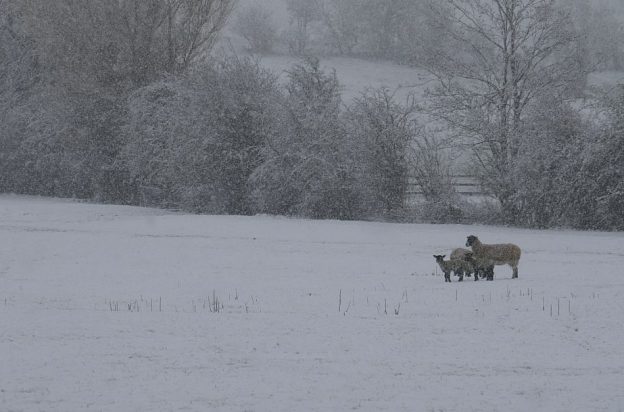Winter is naturally the hardest part of the year for livestock. The cold temperatures mean animals need more calories so they can stay warm as well as maintaining growth. However, you have the issue that grass will grow much slower. You could also have snow covering the pasture. As a result, you may need to provide more forage and animal feed.
Below we want to look at some tips for how you can adapt feeding in winter to ensure your animals will be happy and healthy.
Providing forage
It is important to ensure you provide sufficient forage and that it is good quality. The thing to keep in mind is cattle, sheep and goats (collectively known as ruminants), digest forage to create energy and heat from digestion. As a result, you must make sure animals can eat enough of it.
One thing you need to do here is ensure the forage has adequate protein. It is vital for helping digestion and is essential for growth. Unfortunately low quality hay or grass from winter pasture can lack protein. If it does, you will need to provide supplements or complete animal feed.
Plan for cold nights
It gets much colder at night in winter. You need to think about how this will affect your animals. There are two things you should do here. Firstly, increase the amount of bedding you provide. This will ensure you are helping animals to stay warm.
In addition, you should adapt feeding times and amounts. If you do two feedings per day, it is a good idea to provide the biggest portion in the evening. It will ensure animals have enough for the night and can keep generating body heat.
Move feeding locations
One of the most important things with winter feeding is to reduce the risk of illness. The ground can quickly get muddy because it is colder and wetter. Animals won’t eat if the forage or animal feed gets muddy. That can lead to health problems and weight loss. There is also a higher risk of illness if feeding areas are dirty.
What you should do is move the feeding location regularly. Make sure you choose fresh spots with grass or snow instead of bare or muddy ground. If you use feeders, move them regularly too so they don’t end up covered in mud and manure.
If you feed animals in confined spaces, the risk of food getting dirty is higher. As a result, the chance of illness increases. You need to take extra care with feeders here and should keep spaces clean.
Water
As well as providing forage or animal feed, you must make sure livestock continue to have access to water. It is vital for their wellbeing, especially cattle if you are feeding them hay. If there isn’t enough water, animals may not eat.
The big thing here is you need to make sure water sources don’t freeze. You should check them regularly and take action if they do. This is especially important with cattle. Sheep can sometimes manage by eating snow, but cattle can’t.
Focus on the animals that need extra
Finally, you need to make sure you account for pregnant animals and young ones. They need more help in winter to ensure they are healthy and don’t lose weight. Make sure you provide enough food for them.
Speak to us about animal feed
JS Hubbuck Ltd supports people in the agricultural industry, particularly livestock farmers. We have a wealth of experience and take care to make sure we know all we can about the products we stock. In turn we can advise our clients on the best ones for their needs.
So, if you need any help with selecting animal feed or caring for livestock in winter, please contact us. We are a family run business, ensuring you will always get a friendly service.

